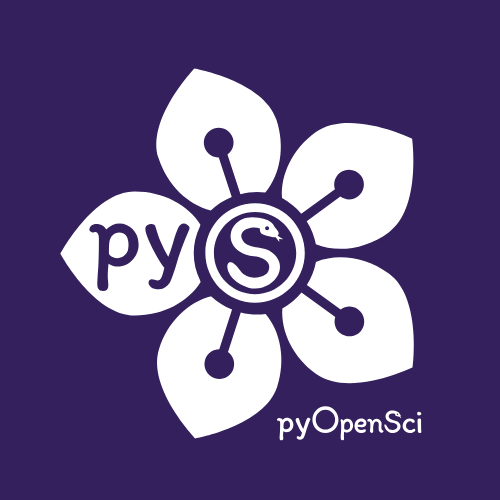Everything that you need to know
- When: Thursday, 6 November 2025 10:00 AM Mountain Time - 12:15 PM Mountain Time
- Where: Interactive webinar with live demos
Cost
Prices are in US Dollars. This workshop not only provides you with expert training, but it also supports the work that pyOpenSci does to support scientific open source.
| Ticket Type | Early Bird (Before 5 November 2025 ) | Regular |
| Regular | $149 | $199 |
| Student | $45 | $85 |
| Partner Community (Astropy, PyHC, OpenAstronomy, Pangeo) | $85 | $85 |
| Partner Community Student (Astropy, PyHC, OpenAstronomy, Pangeo) | $40 | $40 |
Scholarships are available to individuals who have been affected by job loss and funding cuts and who don’t have the resources to attend our training. We will ensure that scholarship recipients represent a diverse range of voices, backgrounds, and experiences. Scholarships are also available to Undergraduate and Graduate level students. Scholarships will reduce the cost of the workshop to 20$ (Students) or 45$ (continuing education, academics and others). We offer a limited number of scholarships. Please be sure to explain why this workshop will benefit your work in Science and the greater open science community when you apply.
To apply for a scholarship, please fill out this Google form.
Your research code deserves to reach more people. In this hands-on workshop, you’ll learn how to transform your Python scripts into professional packages that others can easily install, use, and contribute to. Walk away with a complete packaging workflow and the confidence to share your work with the world.
This workshop is part of pyOpenSci’s commitment to building better research software through accessible packaging practices. Whether you’re sharing analysis tools with colleagues or building the next great Python library, you’ll gain practical skills to package like a pro.
Workshop Structure
Part 1: Modern Python packaging foundations (30 minutes)
- Package Structure: Set up your project the right way from day one
- Essential Files Walkthrough: pyproject.toml, README, and what actually matters
- Tool Decision Framework: Navigate the packaging ecosystem with confidence
Part 2: Build your Python package (30 minutes)
- Live Build Demo: See packaging in action with real code
- Setup Tests: Make sure your package works everywhere and as new pull requests come in
- Quality Checklist: Professional packaging standards made simple
Break (10 minutes)
Part 3: Publish and share your Python package (30 minutes)
- PyPI Publishing: Get your package on the Python Package Index
- Security Best Practices: Protect your package and users when you are publishing using Trusted Publishing.
- Automation Setup: Never manually release your package again; instead use GitHub actions with trusted publishing.
Part 4: Documentation for a healthy project (20 minutes)
- What docs matter most?: A brief overview of documentation to make it easier to onboard both contributors and new maintainers to your project.
Wrap up: Questions (20 Minutes)
- Q&A: Get your questions answered
Why attend
- Learn modern packaging practices used by successful Python projects
- Get production-ready templates and automation you can use immediately
- Understand publishing security best practices from day one
- See live demos of the complete packaging workflow
- Learn from pyOpenSci’s experience reviewing dozens of packages
Perfect for you if…
- You have Python code that others could benefit from using
- You’re tired of sharing code via email or messy file transfers
- You want people to be able to install and use your tools
- You’ve heard of PyPI but don’t know how to get your package there and how to do it securely.
- You want to better understand the complex Python packaging ecosystem
What you’ll walk away with
- Complete Package Template: Ready-to-use project structure
- Automation Workflows: GitHub Actions for testing and publishing
- Quality Checklists: Never miss important packaging steps
- Publishing Guide: Step-by-step instructions for secure PyPI deployment using GitHub actions
Pre-requisites
To successfully follow along in this workshop, you should:
- Know how to write Python code
- Understand how to write and use functions
- Have a Free account to create a GitHub account (you can work using GitHub codespaces during this workshop, and setting this account up is free if you don’t already have one.
- You should have internet access
Your instructors & helpers
- Leah Wasser, the Executive Director and Founder of pyOpenSci, brings over 20 years of experience teaching technical data science topics in the scientific space. pyOpenSci has worked with hundreds of scientific Python package maintainers and has helped over 50 packages improve their structure and distribution through our peer review process.
- Jeremiah Paige: is an open source author, contributor, and speaker, specifically working with Python for over 12 years. He is also a software engineer in the secure supply chain industry during work hours.
- Avik Basu: is an open source contributor, speaker, and mentor. He is a seasoned machine learning engineer with extensive experience in both major tech companies and fast-moving startups.
Connect with us!
There are many ways to get involved if you’re interested!
- If you read through our lessons and want to suggest changes, open an issue in our lessons repository here
- Volunteer to be a reviewer for pyOpenSci’s software review process
- Submit a Python package to pyOpenSci for peer review
- Donate to pyOpenSci to support scholarships for future training events and the development of new learning content.
- Check out our volunteer page for other ways to get involved.
You can also:
- Keep an eye on our events page for upcoming training events.
Follow us on social platforms:
If you are on LinkedIn, check out and subscribe to our newsletter.
You can also:
- Check out our Python Package Guide for comprehensive packaging guidance
- Keep an eye on our events page for upcoming training events

Leave a comment